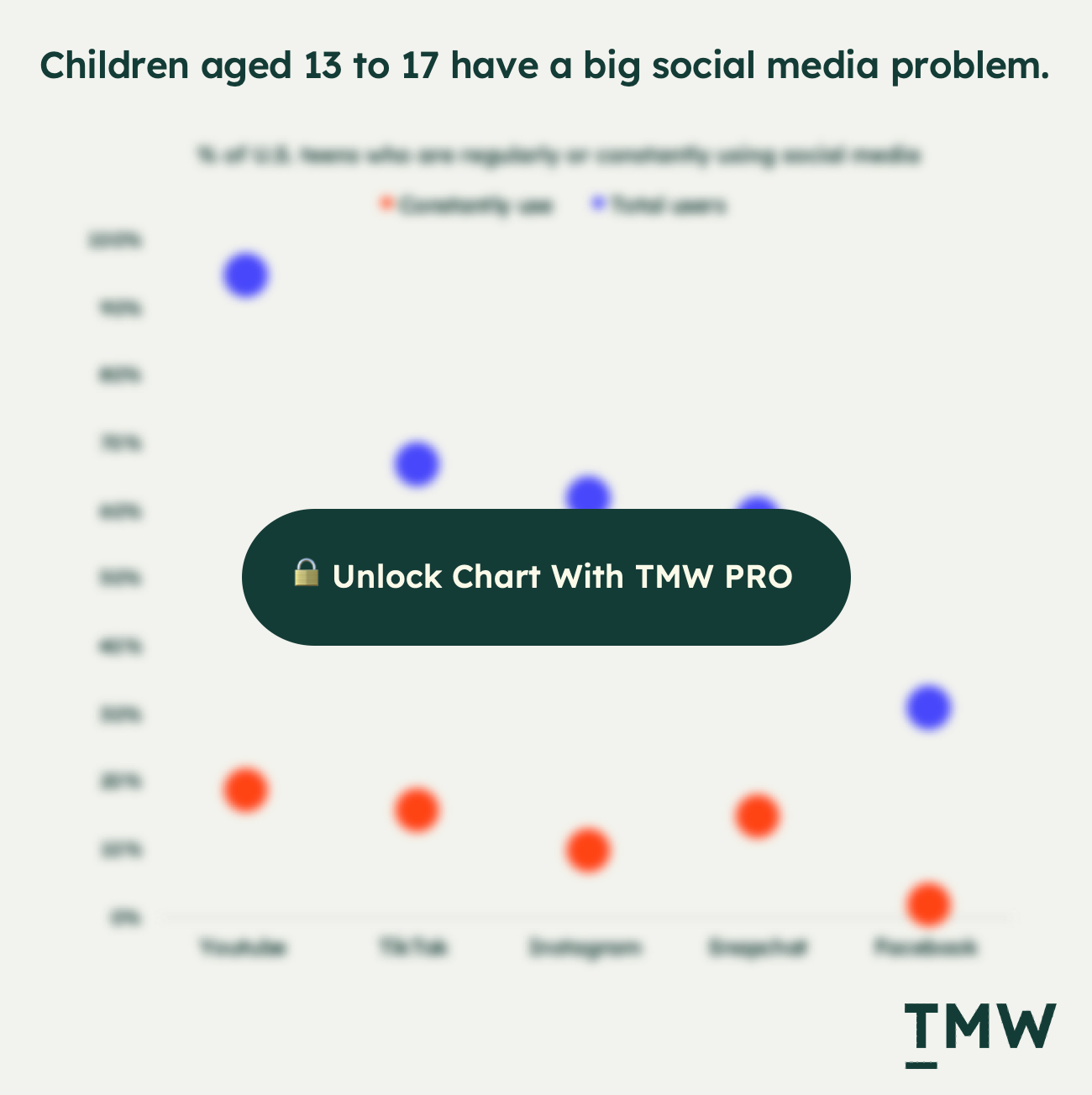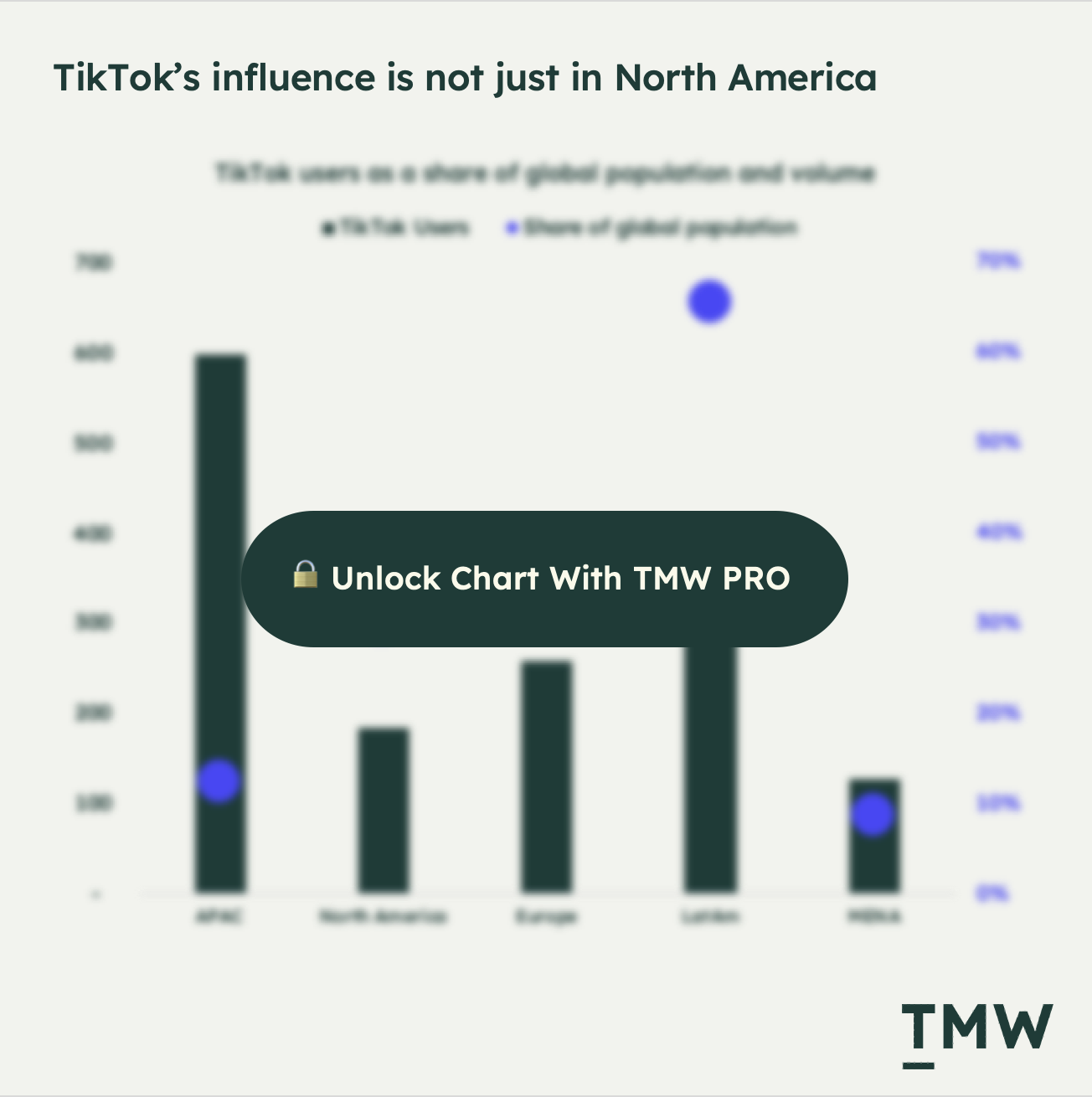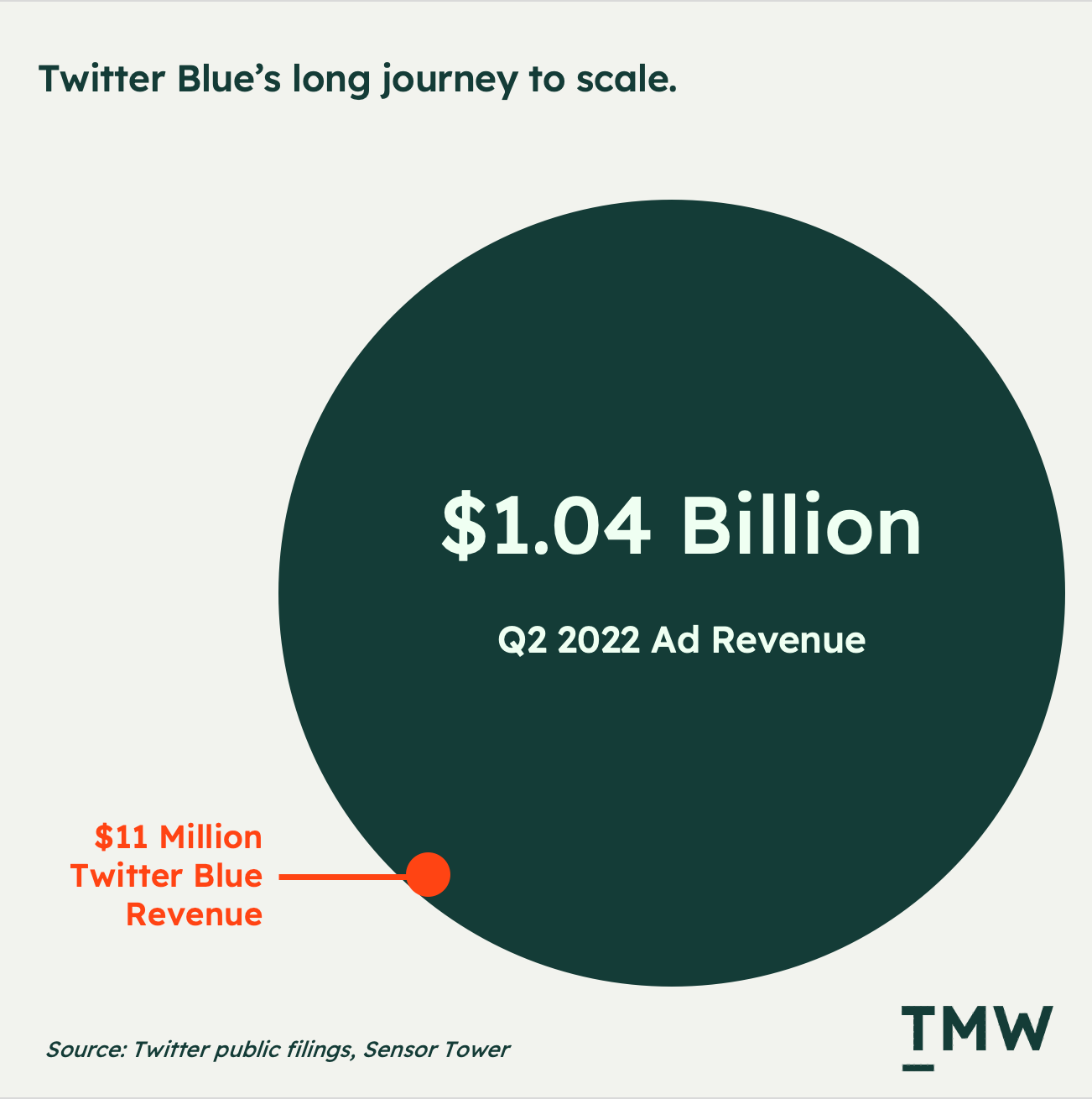TMW #119 | The paradox principle
Welcome to The Martech Weekly, where every week I review some of the most interesting ideas, research, and latest news. I look to where the industry is going and what you should be paying attention to.
👋 Get TMW every Sunday
TMW is the fastest and easiest way to stay ahead of the Martech industry. Sign up to get the full version delivered every Sunday for this and every TMW, along with an invite to the TMW community. Learn more here.
Some news: Big Martech is back for Season 2! This time around Scott Brinker and I are unpacking some of the major trends in Martech, three episodes at a time. The goal is to bring a helpful perspective on how the industry is changing in real-time. Our first series focuses on the end of third-party cookies. Parts 1 and 2 are now available. Link
The paradox principle
Life is filled with paradoxes that make things work. Like a sour note in a chord progression, or a slightly rotten smell that makes perfume smell better, or adding salt to choc chip cookies: Life is about tension. Good and evil, dead and alive, work and rest, love and hate.
The internet is no stranger to this. What made the web successful was that everyone could use it. It created an environment where free, useful apps were accessible to everyone. From a teenager in Bangalore to a whistleblower in Iran to a Silicon Valley executive, the internet we know today flattened hierarchies, created untold billions of opportunities for people, and ushered in a new era of unfettered access to information.
It's also brought about a lot of suffering.
And like the suspension bridge needs tension to keep it strong, the internet is no different. This tension – the balance of good and bad in the form of ads vs privacy, monopolies vs accessibility, globalism vs nationalism, artificial intelligence vs dehumanization, and social media vs misinformation – is a realistic expectation for an open, competitive internet.
But what I’m concerned about is that these tensions are now unraveling in real-time. For a marketer working online (and who isn’t), there is a mountain of new things to consider and plan for every morning as social media networks change their model, generative AI continues to break into the mass consumer, and the national security of the United States challenges a supermassive social media app. These are all tensions we must embrace if we are to defend against disruption and find ways to grow brands and satisfy customers.
This essay brings together several themes I’ve written about in the past into somewhat of an organizing idea. Something that underlies most of the challenges of the open web we see today is the paradox – how do we preserve the kind of tension that suspends a bridge, while anticipating what kind of tension will make it collapse?
TikTok – The globalization paradox
TikTok has more than 150 million users in the United States and is one of the fastest-growing social apps in the world. It’s so popular that it's become a boon to advertisers and influencers who can quickly amass huge audiences, but the app also works as a black hole of human attention and creativity. Especially among young people.

TikTok not only faces ethical questions about the app’s role in our declining mental health among young people; the app poses huge challenges to national security. Not only in the US but in every other country outside of China. The problem here is that TikTok is owned by ByteDance, a Chinese technology company. And ByteDance is subject to Chinese control including TikTok.
The CEO of TikTok faced a congressional hearing this week, which came off as a mixture of clueless legislators, extreme concern for national security, and a social media executive that can’t see how ownership of TikTok matters regardless of promises to firewall the social media app away from ByteDance.
The challenge is that the US government can’t figure out which problem they should be focusing on. Is it data privacy? Surely the Chinese Communist Party would value data collection and access from American consumers (and from TikTok’s audiences around the world). Is it Chinese interference in US media and content consumption? That’s something every other country has had to reckon with, even from US companies Meta, Google, Amazon, and Microsoft to name a few. Is it an unequal playing field? China bans US apps but expects the US to welcome Chinese apps. Is it an exponentially-growing share of US advertising spending falling into a Chinese-owned company’s bank accounts?
So, which one is it? No one can really tell definitively. But the thing that brings all of these problems together is that China is a rival global power with a radically different political and sociological worldview to the United States, which makes any one of these problems a major issue for national security.
But centering TikTok’s future on American issues misses the entire point of where the app is growing the most. Sure, the United States is undoubtedly the best market for any social media app. But if you look across the growth rates of TikTok as a share of each region’s population, what becomes immediately clear is that the United States is table stakes compared to places like Latin America, Asia Pacific, or Europe. If national security is a big problem for the United States, why wouldn’t it be for other major democratic societies?

TikTok is a real-time case study into what happens when two superpowers have an ideological conflict. There’s a good chance that TikTok could contribute to the breakout of war between China and the United States if not resolved.
Although the situation between TikTok and the United States seems benign – just another supermassive social app facing public scrutiny – but nothing could be more detrimental to relations between the United States and China. Technology has always had a forcing function for ideological conflict. And the tug-of-war for TikTok is a prime example of this.
Just as much as the printing press was the innovation that triggered a generation of political conflict and war in Europe, or that the invention of cryptography made it far harder to defeat Nazi Germany in World War Two, historically speaking, technological innovation usually played a large role in international conflicts.
The question you must ask yourself is if this tension is worth living with. If you’re working with a brand, you’re probably investing ad dollars into TikTok. If you’re a tech vendor, you’re probably thinking about integrating with TikTok. If you’re trying to build a personal brand, you’re probably creating TikTok videos. If you’re bored, you’re probably thinking about scrolling TikTok. To answer the question, you need to determine if your participation with this app is worth it. And for more than 150 million Americans, the answer is yes.
The tension of this bridge is not the issue; it’s where the bridge is taking us. And TikTok’s journey is a journey to increased phone addiction and political surveillance from a hostile foreign nation. And yet the app is one of the most effective channels for reaching customers. It would be a sad irony that a Chinese social media app leads to World War Three because we can’t get enough viral videos. But the tension persists, and you have a choice.
Advertising – The free internet paradox
The internet is like a street paved with ad space. The roads, the hospitals, the playgrounds and the public parks are all funded by ad monetization. And now that’s starting to unravel. With the deprecation of third-party cookies coming to a head, there’s been a mad scramble for what should replace it.
And the replacement question is interesting as it sits at the heart of one of the web’s oldest tensions: turning attention into money makes the web free for everyone. You would think that third-party cookie deprecating is a problem for marketers. And in a lot of ways, it is. Cookies were a decentralized technology that stored personal information on a device. This was used to create an entire advertising economy. And now that economy is imploding because technology platforms and regulators are moving past it. But who will be impacted the most is the five billion people who use the internet and rely on it to find career opportunities (LinkedIn), access to information (Google), stay in contact with friends (Meta), get the news (Twitter), and find romance (Tinder) is all at stake.
And the ground zero for the shift away from ad-monetized platforms is Twitter.
Since Elon Musk’s acquisition of the bird app, a lot has changed. But one thing that is a constant is the app’s walling off previously free features so that people pay $8 a month for Twitter Blue. Twitter will soon switch off its public figure verification for everyone – forcing all the high-profile people to pay for Twitter Blue. Elon has also stated this week that those who are not paying the $8 month will now be deprioritized in the For You newsfeed, again penalizing users for the years of work building an audience they will not be able to fully reach without paying.
As Natasha Lomas writes in her piece “Twitter is Dying”, Twitter was a gift for so many people because of how much knowledge, community, and relationships it unlocked:
The running joke became ‘how is this site free?!’ Because the interactions could be so remarkable — so show-stopping or fascinating — that it felt incredible to encounter this kind of proximity (to knowledge or stardust) for free. However, if the point is simply pure destruction — building a chaos machine by removing a source of valuable information from our connected world, where groups of all stripes could communicate and organize, and replacing that with a place of parody that rewards insincerity, time-wasting and the worst forms of communication in order to degrade the better half — then he’s done a remarkable job in very short order. Truly it’s an amazing act of demolition. But, well, $44 billion can buy you a lot of wrecking balls.
We have created a consumer base that is used to having the most innovative and powerful technology the world has ever seen for essentially free. And now that’s changing. Twitter is now increasing its hostility against users by restarting more features for free users creating a class divide between people who have a spare $8 a month and those that cannot ever imagine having that kind of money to spend on an online service. Meta is also experimenting with asking people to pay for previously free services on their social apps too.

If free services become increasingly inhospitable, this has the potential to unravel the entire premise of the open internet. Paying for Twitter, Facebook or Instagram destroys the fundamental value of these apps – that everyone’s on them. And that value proposition is made possible by making them free to use. But as targeted advertising becomes harder to do in an increasingly privacy-focused advertising market, expect more people to abandon social media apps altogether.
Cookie deprecation has that kind of potential, and so does a sinister format for thinking about data privacy – that the Adtech and Martech companies are the bad guys. It’s a form of privacy extremism that places data collection as this kind of violation of our privacy that must be eliminated. Apple’s messaging around this is especially nefarious, invoking the UN Declaration of Human Rights as the foundation for closeting off app tracking and introducing ITP 3.0. But in reality, they are personalizing your ads while all other companies don’t get that kind of privilege. Privacy for thee but not for me.
Cookies functioned as the tension cord on a suspension bridge. Balancing the growing investment in targeted advertising with democratizing the ability to grow a brand online facilitates all the free services we have come to expect. Paying for social media is going to become the defining challenge as an ad-powered-but-free web becomes seen by consumers, regulators and marketers as an unethical, harmful and surveilling force to remove.
Generative AI – The dehumanization paradox
The last tension has been on a slow crawl for a long time. But as AI becomes more mainstream and eats into almost every other industry, the tension between empowering humans to do better, more meaningful work and replacing that work with more capable machines becomes even more important.
An interesting way of thinking about this is the breakout success of ChatGPT. OpenAI, the product’s parent company, has recently done a study on how AI will replace jobs, looking into how some careers have far greater exposure to AI replacement than others. Let’s just say that the outlook is grim.
From OpenAI:
Our findings confirm the hypothesis that these technologies can have pervasive impacts across a wide swath of occupations in the US and that additional advancements supported by LLMs, mainly through software and digital tools, can have significant effects on a range of economic activities. However, while the technical capacity for LLMs to make human labor more efficient appears evident, it is important to recognize that social, economic, regulatory, and other factors will influence actual labor productivity outcomes. As capabilities continue to evolve, the impact of LLMs on the economy will likely persist and increase, posing challenges for policymakers in predicting and regulating their trajectory.

The idea that AI will play a large role in bringing us closer to personal fulfillment seems implausible at best and disastrous at worst. The experiment of figuring out which one will be conducted by the marketing department –the group of people with the most to win and lose with AI.
As I made the argument last week in “a new frontier for personalization” so much of what ChatGPT has brought to the world is already being applied to a wide variety of areas that marketing technologies used to facilitate. Soon enough we’ll see a plethora of generative integrations, generative software, generative analytics, generative design, generative consulting, generative products, generative content, and more. My working hypothesis here is that anything that handles language can be automated with an LLM. And while concern over opening Pandora’s box of LLMs onto the world is growing, once the technology is out there, it’s impossible to stop.
But this paradox is more about figuring out what the internet looks like when most of what we experience is not produced by real human beings anymore. What we will get are social media apps that come close to being unusable. If the story of millennials creating content on the web was about mastering the algorithm for engagement, then the next generation’s task will be to master the prompt. Instead of creating, we will become skilled in asking. And asking an omnipresent intelligence that grants our wishes and answers all of our questions. There are even highly lucrative jobs now listed for “prompt engineers” - the people that whisper into AIs to produce remarkable images, text, and videos. Interest in prompt engineering went from a slightly dystopian joke to the hot new job in about 15 seconds.

The tension is how much these technologies dehumanize people on the internet. And that tension is important. Without human creation, all we have is an empty vacuum of meaningless content. Which has the potential to undo everything the internet has brought to us – access to (mostly) high-quality information.
The consequence of this is that if we can’t trust that the content itself is real, then everything becomes unreliable. For example, this week the pope in a coat meme rocked the internet because so many people thought that this was a real photo. But it’s not - it’s just a very good, finely-tuned output from Midjourney version 5.
Right now, I don’t think consumers really care about this tension at all. If growth in this space is any indication of our desire to use this technology, then ChatGPT is what we want, despite the consequences.

New problems, new paradoxes.
There’s been a lot of doom and gloom in this essay, but the risks are real as the balancing act of the internet becomes harder and harder to do across a variety of vectors. The paradox of an internet that is increasingly becoming globalized means differing political systems will need to reconcile the place of foreign yet hyper-popular apps in their midst. Not getting that tension right could stall the entire economy of the web by closing off major populations to the innovations of other countries, or by triggering international conflict.
The free internet itself is undergoing a titanic shift away from the business models that allowed almost anyone to find information and opportunity. Most of that was funded by marketers, but if social apps want to start charging users for their services, then the pool of access becomes smaller and smaller, impacting not only who gets to enjoy the benefits of an open web, but also the ability to grow a brand within it.
And if our embrace of ChatGPT and other generative technologies means we are literally unshackled from the ability to create almost anything we want online, then this poses a huge risk to wiping out entire careers, misinformation at scale, and fundamentally, our own dehumanization.
Ultimately, the choice is ours. We can choose to use TikTok (or not). We can choose to pay for Twitter (or not). We can choose to embrace ChatGPT (or not). In a way, the paradox of the internet is that all of us have a choice on which side of the balancing act we want to participate in. But like almost every trend to come before us, it’s the crowd that gets to choose. In other words, salt in cookies is delicious, but if you heat up salt enough and add it to water, it explodes.
Stay Curious,
Make sense of marketing technology.
Sign up now to get TMW delivered to your inbox every Sunday evening plus an invite to the slack community.
Want to share something interesting or be featured in The Martech Weekly? Drop me a line at juan@themartechweekly.com.
